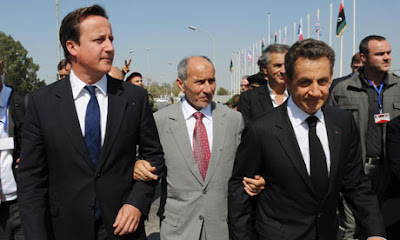
Two sides are fighting a cold war over the nature of Libya's new political order.
Soumaya Ghannoushi
Al-Jazeera
"....The vacuum created by Gaddafi's departure is now filled by a sharp polarisation between two camps. The first camp is the National Transitional Council, made up largely of ex-ministers and prominent senior Gaddafi officials who had jumped from his ship as it began to sink. These enjoy the support of NATO and derive their power and influence from the backing of western nations. The second camp is composed of local political and military leaders who have played a decisive role in the liberation of the various Libyan cities from Gaddafi's brigades, including the capital. The thousands of fighters and activists they command are now convened within local military councils, such as the Tripoli council, which was founded following the liberation of the capital and which recently elected as its head Abdulkarim Bel Haj. Ironically, this hero of Tripoli's liberation is the same man who, a few years back, had been deported, along with other Libyan dissidents, by MI6 and the CIA to Gaddafi, who was their close ally at the time.
There could be no more striking indication of the rift between the two sides than the words of Mustafa Abdul-Jalil, the head of the council and ex-justice minister, on the eve of Tripoli's conquest. Amid the jubilation and euphoria, a downbeat Abdul-Jalil emerged to warn that there exist "extremist fundamentalists within the ranks of the rebels" threatening to resign if they did not hand over their weapons.....
Libya is set to be a scene of multiple battles: conflicts between NATO's men and the fighters and their supporters on the ground, and conflicts between the foreign forces that have invested in the war on Gaddafi: the French, who are determined to have the upper hand politically and economically; the Italians, who regard Libya as their back garden; the British, who are determined to safeguard their contracts; and the Turks, keen to revive their influence in the old Ottoman hemisphere. Then there are the losing players in the new equation: the Chinese and the Russians."
Soumaya Ghannoushi
Al-Jazeera
"....The vacuum created by Gaddafi's departure is now filled by a sharp polarisation between two camps. The first camp is the National Transitional Council, made up largely of ex-ministers and prominent senior Gaddafi officials who had jumped from his ship as it began to sink. These enjoy the support of NATO and derive their power and influence from the backing of western nations. The second camp is composed of local political and military leaders who have played a decisive role in the liberation of the various Libyan cities from Gaddafi's brigades, including the capital. The thousands of fighters and activists they command are now convened within local military councils, such as the Tripoli council, which was founded following the liberation of the capital and which recently elected as its head Abdulkarim Bel Haj. Ironically, this hero of Tripoli's liberation is the same man who, a few years back, had been deported, along with other Libyan dissidents, by MI6 and the CIA to Gaddafi, who was their close ally at the time.
There could be no more striking indication of the rift between the two sides than the words of Mustafa Abdul-Jalil, the head of the council and ex-justice minister, on the eve of Tripoli's conquest. Amid the jubilation and euphoria, a downbeat Abdul-Jalil emerged to warn that there exist "extremist fundamentalists within the ranks of the rebels" threatening to resign if they did not hand over their weapons.....
Libya is set to be a scene of multiple battles: conflicts between NATO's men and the fighters and their supporters on the ground, and conflicts between the foreign forces that have invested in the war on Gaddafi: the French, who are determined to have the upper hand politically and economically; the Italians, who regard Libya as their back garden; the British, who are determined to safeguard their contracts; and the Turks, keen to revive their influence in the old Ottoman hemisphere. Then there are the losing players in the new equation: the Chinese and the Russians."

No comments:
Post a Comment